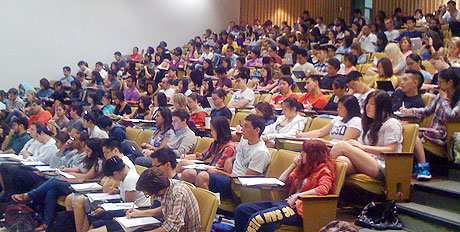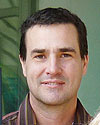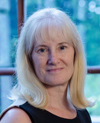Resources & Courses
- BioClock Studio
- Circadian Rhythms-Biological Clocks
- Circadian Rhythms and Health
- Videos - Interviews
- CCB Graphics
Circadian Rhythms-Biological Clocks is an upper-level undergraduate course taught jointly between the Division of Biological Sciences (as BIMM 116) and the Department of Psychology (as PSYC 133). This 4 credit-hour course explores the fundamental properties and mechanisms of the daily biological clock in humans, other animals, plants, and microbes. Topics include the experimental approaches that are employed to understand how organisms keep time and the relationship of the clock to human health. Prerequisites are Psychology 106 or BILD 1 or consent of instructor.

The course is offered every Fall quarter, taught jointly by Drs. Michael Gorman and Susan Golden, with an enrollment of approximately 300 students. Guest speakers chosen from the CCB faculty will be invited to speak on their areas of specialty.
 Michael Gorman
Michael Gorman
Professor
Department of Psychology
Executive Committee, Center for Circadian Biology
I joined the faculty of the UCSD Psychology Department in 1998, where I have witnessed the growth of UCSD as a "world capital" of circadian research. As a psychologist, my work naturally includes a heavy focus on behavior, particularly how the environment influences the rest/activity cycles of rodents and how physiology and behavior are programmed to vary on a season basis. Recently, we have also begun exploring how circadian clocks influence alcohol dependence and addiction in mice. The thrill of this class -- and of my research -- is in illustrating how environments, genes, cells, brains and behavior fit together as a solution to the adaptive problem of a spinning earth tilted on its axis and the consequences of those evolutionary solutions for human behavior.
 Susan Golden
Susan Golden
Distinguished Professor
Division of Biological Sciences
Director, Center for Circadian Biology
I'm relatively new to UCSD, moving my lab here in November 2008 after almost 23 years as a professor at Texas A&M University. My specialty is in cyanobacteria -- a type of photosynthetic bacteria sometimes called "bluegreen algae" that carry out the same kind of photosynthesis as plants. So far, cyanobacteria are the only bacteria we know of that have genuine circadian rhythms. My lab developed the genetic model system for studying the cyanobacterial circadian clock, which we approach through genetics, genomics, biochemistry, and structural biology. UCSD has an exceptional strength and breadth of circadian researchers, spanning work like mine to sleep research in humans. This class provides a wonderful forum in which students can tap the rich resource of circadian biology at UCSD, and I'm happy to be a part of it.